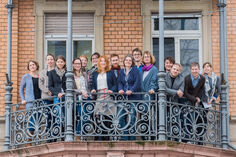Competence Development of Psychotherapy Trainees (KPA)
Principal Investigator: Prof. Dr. phil. Svenja Taubner, Prof. Dr. phil. Heidi Möller
Funding: German Research Foundation (DFG)
Duration: 2011-2016
Background
Therapist characteristics and the therapeutic relationship have a significant impact on psychotherapy outcome. The quality of psychotherapeutic treatments is ensured by extensive psychotherapy training that aims to improve the competence of future psychotherapists. However, there are hardly any longitudinal and systematic studies that investigate the competence development of psychotherapy trainees.
Study
The KPA study is a naturalistic, longitudinal study that investigated the competence development of German psychotherapy trainees over three years of training. Participants consisted of psychoanalytic, psychodynamic, and cognitive-behavioral trainees as well as a control group. A total of 219 trainees and controls participated in the study.
Trainee development was assessed on three competence dimensions: professional-conceptual competence, personal competence, and relational competence. Professional-conceptual competence was measured via trainees’ knowledge, case-formulation competence, and therapist work involvement. Personal competence measures included participants’ attachment, reflective functioning, introject affiliation, and attributional complexity. Relational competence was assessed via measures of relatedness in patient treatments.
Selected Publications
Evers, O., Schröder-Pfeifer, P., Möller, H., & Taubner, S. (2020). Improving professionally and relationally while stagnating in personal competence – the competence development over three years in German psychotherapy training [Manuscript submitted for publication].
Evers, O., Schröder-Pfeifer, P., Möller, H., & Taubner, S. (2020). The impact of trainee characteristics and training variables on competence deterioration: Results from a longitudinal study in naturalistic psychotherapy training [Manuscript submitted for publication].
Evers, O., Schröder-Pfeifer, P., Möller, H., & Taubner, S. (2019). How do personal and professional characteristics influence the development of psychotherapists in training: Results from a longitudinal study. Research in Psychotherapy: Psychopathology, Process and Outcome, 22(3), 389-401. doi:10.4081/ripppo.2019.424
Evers, O., & Taubner, S. (2019). Kompetenzentwicklung in der Psychotherapieausbildung. Psychotherapie im Dialog, 20, 58-63. doi:10.1055/a-0771-7912
Fincke, J. I., Möller, H., & Taubner, S. (2015). Does interpersonal behavior of psychotherapy trainees differ in private and professional relationships? Frontiers in Psychology, 6, 765. doi:10.3389/fpsyg.2015.00765
Klasen, J., Nolte, T., Möller, H., & Taubner, S. (2019). Aversive Kindheitserfahrungen, Bindungsrepräsentationen und Mentalisierungsfähigkeit von Psychotherapeuten in Ausbildung. Zeitschrift für Psychosomatische Medizin und Psychotherapie, 64(4), 353-371.
Proll, B., Hanke, W., Klasen, J., Möller, H., & Taubner, S. (2014). Theoriewissen und Kompetenz zur Fallkonzeption von Psychotherapeuten in Ausbildung. Psychotherapeutenjournal, 13(4), 366-373.
Taubner, S., & Evers, O. (2020). Der effiziente Therapeut in Therapie und Ausbildung. In S. Trautmann-Voigt & B. Voigt (Eds.), Effizienz und Effektivität in der Psychotherapie (pp. 205-226). Gießen: Psychosozial Verlag.
Taubner, S., Klasen, J., Hanke, W., & Möller, H. (2015). Ein empirischer Zugang zur Erfassung der Kompetenzentwicklung von PsychotherapeutInnen in Ausbildung. Psychotherapie Forum, 20(1), 47-53. doi:10.1007/s00729-015-0035-6
Taubner, S., Munder, T., Möller, H., Hanke, W., & Klasen, J. (2014). Selbstselektionsprozesse bei der Wahl des therapeutischen Ausbildungsverfahrens: Unterschiede in therapeutischen Haltungen, Persönlichkeitseigenschaften und dem Mentalisierungsinteresse. Psychother Psych Med, 64(06), 214-223. doi:10.1055/s-0033-1358720
Taubner, S., Ulrich-Manns, S., Klasen, J., Curth, C., Möller, H., & Wolter, S. (2014). Innere Arbeitsmodelle von Bindung und aversive Kindheitserfahrungen bei Psychotherapeuten in Ausbildung. Psychotherapie Forum, 19(1), 2-12. doi:10.1007/s00729-014-0005-4
Taubner, S., Zimmermann, J., Kächele, H., Möller, H., & Sell, C. (2013). The relationship of introject affiliation and personal therapy to trainee self-efficacy: A longitudinal study among psychotherapy trainees. Psychotherapy, 50(2), 167-177. doi:10.1037/a0029819



